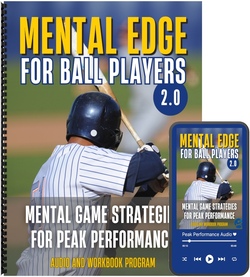Developing a Positive Attitude to Improve Success
What affects your baseball confidence the most?
Some may say your thoughts and it is very true that your thoughts affect confidence. Think about making mistakes and your confidence drops while thinking about your talents tend to enhance confidence.
Another factor that impacts confidence is your actions, both your preparation and performance. When you prepare fully, you are more confident and when performing well improves confidence.
Even your feelings play a part in your level of confidence. Negative emotions, such as; frustration, resignation, anger detract from your confidence and positive emotions foster a greater sense of confidence.
Although there are many factors that play a part in how confident you are as a ball player, there is one factor that impacts your thoughts, actions and emotions…
The difference-maker when it comes to confidence is your beliefs.
Your beliefs is like your personal philosophy or how you see things. A positive mental attitude will help you spin events to benefit your confidence.
To illustrate how attitude affects confidence, let’s use this illustration of Johnny G., a high school third baseman…
Johnny sees most things from a negative perspective.
Despite having a .310 batting average, Johnny lacks confidence on the field.
When Johnny has a multiple hit game, he normally attributes those hits to bad pitching, luck or poor fielding.
When Johnny goes hitless in a game, his confidence drops even lower.
Johnny’s has thoughts such as, “I knew I couldn’t hit.”
Johnny tends to get frustrated and anxious if his first at-bat results in an out which affects the rest of his game, even how he plays in the field.
During practices, because he already perceives himself as lacking talent, he half-heartedly takes batting practice and thinks, “Nothing will help me.”
Johnny’s pessimistic attitude slants everything towards the negative.
The end result… a baseball player with talent but no confidence.
Johnny will never get to see how well he can play if he lacks the confidence in his ability to play…
If you have a negative outlook, you will doom yourself to low confidence and under-performance.
Let’s see the flip side of the coin… a positive attitude.
Nick Green is a 22-year-old pitcher for the Charleston RiverDogs, a Yankee affiliate. A month before being acquired by the Yankees organization in a trade last summer, Green summarized his guiding philosophy.
GREEN: “I just want to show my consistency and show my mental toughness, show my mental strength on the mound and show that I can beat any hitter out there. I just want to be confident and know that I’m confident in my abilities, and keep pushing as much as I can to be the best.”
That is a bold statement by Green but it is grounded in his positive attitude.
Green’s confidence is evident but it is his positive attitude that has him pushing for continual improvement. A bad game is merely feedback for improvement, not evidence of a lack of ability.
Green averages almost seven strikeouts a game despite having a 2-3 record.
It’s Green’s mental attitude that has given him the confidence to become one of the Yankees’ most promising prospects.
If you are in need of a confidence boost, first look at your beliefs.
Tips For Improving Your Confidence:
Get in the habit of asking yourself, “What is good here?” What are my talents?”
Every experience has some positive takeaways. Even a game where you struck out four times can teach you to be more patient at the plate, take time to relax during pitches or engage in a better approach to each at-bat.
Related Sports Psychology Articles
- How to Contribute to a Positive Team Mindset
- Joe Saunders Stays Positive After Loss
- How to Develop a Ball Player Championship Mindset
*Subscribe to The Sports Psychology Podcast on iTunes
*Subscribe to The Sports Psychology Podcast on Spotify
Get The Mental Edge for Baseball and Softball
If you have trouble taking your practice game to competition and under perform in games, your mental game might be the culprit! Baseball and softball players contact me everyday wanting to know why they become scared, anxious, afraid to make mistakes, and lack trust in their skills during games…
You might have a ton of physical talent and perform great in practice, but if you can’t get the job done when it counts, something is missing and the problem is an inferior mental game–not talent or motivation.
We’ve spent the last six months developing a program to teach you how to improve your mental game in 8 easy-to-apply lessons–the same TOP lessons that I teach to baseball and softball players everyday in my one-on-one mental coaching program!


